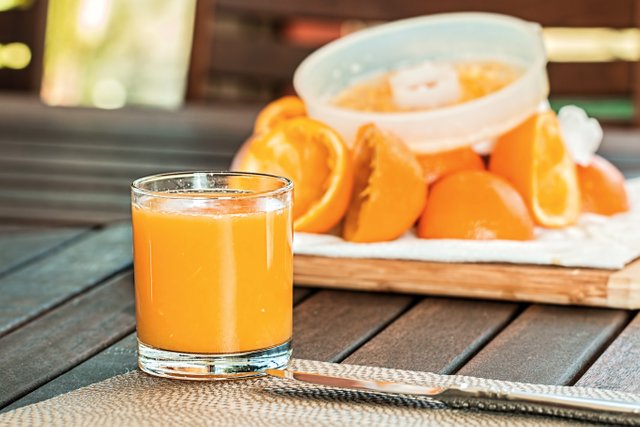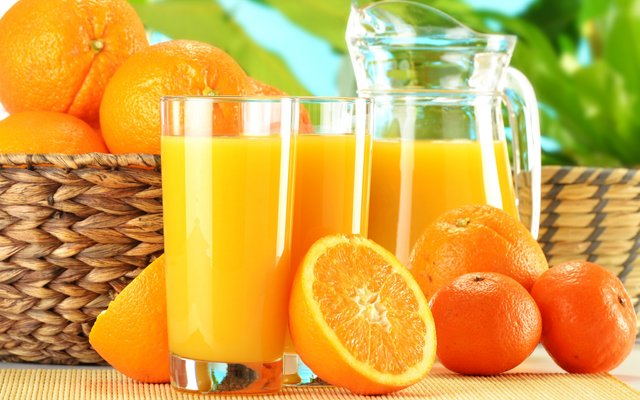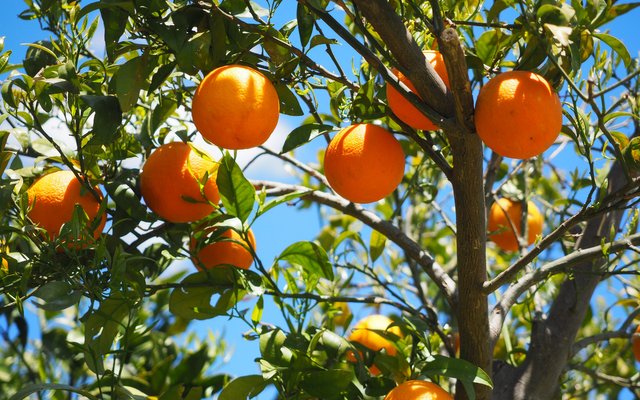MY DEAR STEEMIANS, THESE DAYS WE ARE ENJOYING, ORANGE, THE MOST BEAUTIFUL FRUIT IN THE WORLD.

THE BENEFITS OF ORANGE:
Benefits
The nutrients in oranges offer a range of health benefits.
Stroke
Orange and orange peel
One orange provides a range of vitamins and minerals; a staggering 130 percent of your vitamin C needs for the day.
According to the American Heart Association (AHA), eating higher amounts of a compound found in citrus fruits like oranges and grapefruit may lower ischemic stroke risk for women.
Those who ate the highest amounts of citrus had a 19 percent lower risk of ischemic stroke than women who consumed the least. 5
Blood pressure
Maintaining a low sodium intake is essential to lowering blood pressure, however increasing potassium intake may be just as important because of its vasodilation effects.
According to the National Health and Nutrition Examination Survey (NHANES), fewer than 2 percent of US adults meet the daily 4700 mg recommendation.3
Also of note, a high potassium intake is associated with a 20 percent decreased risk of dying from all causes.3
Cancer
According to a study published in the American Journal of Epidemiology, consuming bananas, oranges and orange juice in the first two years of life may reduce the risk of developing childhood leukemia. (resource no longer available at www.bastyrcenter.org)
As an excellent source of the strong antioxidant vitamin C, oranges can also help combat the formation of free radicals known to cause cancer.
While an adequate vitamin C intake is necessary and very beneficial as an antioxidant, the amount necessary to consume for therapeutic purposes for cancer is more than we can consume.1
One study has concluded that vitamin C from oranges could one day be harnessed to impair colorectal cancer cells, but 300-oranges worth of vitamin C would be needed.
High fiber intakes from fruits and vegetables are associated with a lowered risk of colorectal cancer.
However, in 2015, a study linked grapefruit and orange juice with a higher risk of skin cancer. Researchers found that people who consumed high amounts of whole grapefruit or orange juice were over a third more likely to develop melanoma, compared with those who consumed low amounts.
Heart health
The fiber, potassium, vitamin C and choline content in oranges all support heart health.
An increase in potassium intake along with a decrease in sodium intake is the most important dietary change that a person can make to reduce their risk of cardiovascular disease, according to Dr. Mark Houston, an associate clinical professor of medicine at Vanderbilt Medical School and director of the Hypertension Institute at St. Thomas Hospital in Tennessee.3
ORANGE JUICE:
In one study, those who consumed 4069 mg of potassium per day had a 49 percent lower risk of death from ischemic heart disease compared with those who consumed less potassium (about 1000 mg per day).3
High potassium intakes are also associated with a reduced risk of stroke, protection against loss of muscle mass, preservation of bone mineral density and reduction in the formation of kidney stones.3
Diabetes
Studies have shown that type 1 diabetics who consume high-fiber diets have lower blood glucose levels and type 2 diabetics may have improved blood sugar, lipids and insulin levels. One medium banana provides about 3 grams of fiber.
The Dietary Guidelines for Americans recommend 21-25 g/day for women and 30-38 g/day for men.
Skin
The antioxidant vitamin C, when eaten in its natural form (as in an orange) or applied topically, can help to fight skin damage caused by the sun and pollution, reduce wrinkles and improve overall skin texture. Vitamin C plays a vital role in the formation of collagen, the support system of your skin
Nutrition
One medium orange (approximately 154 grams) contains 80 calories, 0 grams of fat, 250 milligrams of potassium, 19 grams of carbohydrate (14 grams of sugar and 3 grams of dietary fiber) as well as 1 gram of protein.
One orange provides 130 percent of your vitamin C needs for the day, 2 percent of vitamin A needs, 6 percent of calcium and 0 percent of iron.
Oranges also contain thiamin, riboflavin, niacin, vitamin B-6, folate, pantothenic acid, phosphorus, magnesium, manganese, selenium and copper. Because of their high vitamin C content (over twice the daily need) oranges are associated with boosting the immune system.
Oranges also contain choline, zeaxanthin, and carotenoids.
Choline is an important nutrient found in oranges that helps with sleep, muscle movement, learning and memory. Choline also helps to maintain the structure of cellular membranes, aids in the transmission of nerve impulses, assists in the absorption of fat and reduces chronic inflammation.2
Zeaxanthin and carotenoids have antioxidant effects and have been shown to have an inverse relationship with overall cancer rates and prostate cancer in particular.
Dietary tips
Orange segments
There are a variety of orange types on offer that can aid in various conditions from heart health to diabetes.
Oranges should be picked at their peak of ripeness because unlike some other fruits, they do not ripen or improve in quality after being picked. Oranges should be stored at room temperature, away from direct sunlight.
While it is hard to find good fruits and vegetables in the winter, it is the perfect time to buy citrus. Winter is the peak season for oranges and other citrus fruits.
There are many different types of oranges available such as navel, mandarin, cara cara, blood oranges, Valencia and Seville oranges just to name a few. Some are very sweet and others have more of a sour taste.
Tips for oranges:
Keep a bowl on the kitchen table or counter stocked with fresh fruit from the season. Seeing the fruits readily available will likely cause you to choose them as a snack more often rather than raiding the cupboards for a less healthy snack.
Make a fruit salad with strawberries, pineapple, mandarin oranges and grapes.
Add some orange slices to your salad at lunch or dinner. Compliment the oranges with walnuts or pecans, a crumbled cheese and a light balsamic or citrus vinaigrette dressing.
Make your own juice! Nothing tastes better than freshly squeezed orange juice in the morning. When you make your own, you can be sure there are no added preservatives or sweeteners.
Risks
Beta-blockers, a type of medication most commonly prescribed for heart disease, can cause potassium levels to increase in the blood. High potassium foods such as oranges and bananas should be consumed in moderation when taking beta-blockers.
Consuming too much potassium can be harmful for those whose kidneys are not fully functional. If your kidneys are unable to remove excess potassium from the blood, it could be fatal.
Those with gastro-esophageal reflux disease (GERD) may experience an increase in symptoms such as heartburn and regurgitation when consuming highly acidic foods such as citrus fruit, however individual reactions vary.
It is the total diet or overall eating pattern that is most important in disease prevention and achieving good health. It is better to eat a diet with variety than to concentrate on individual foods as the key to good health.
I love this fruit a health winner!
Awsome.
cool joseph - citrus r the best - I am also a developer :)